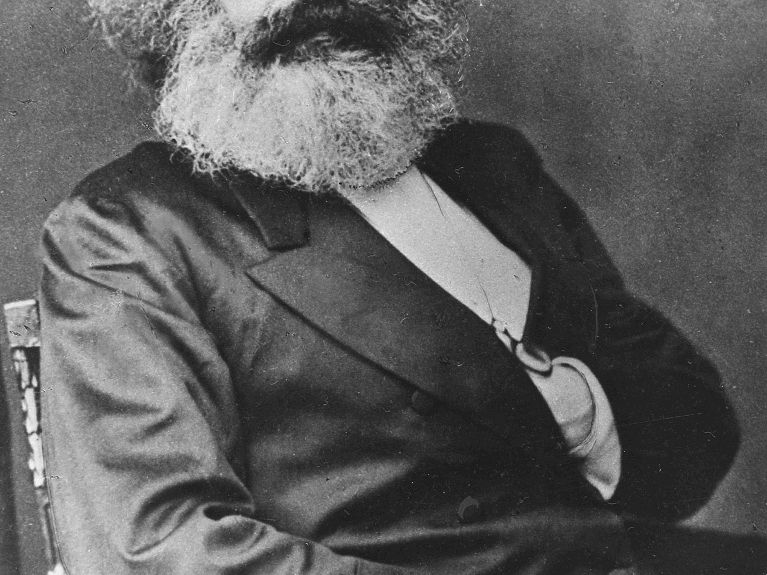Seven facts about Karl Marx
200 years of Karl Marx: some facts that explain why the German thinker still fascinates people all over the world today.

Germany. A visionary on justice and critic of capitalism, strident journalist and astute economist: Karl Marx (1818–1883) still influences people today – from Trier to the USA and China. Here are seven facts about a life that made a big impact:
The International
In 1845, the young journalist Karl Marx was expelled from Paris. Prussia had put pressure on France because of his revolutionary writings. Marx gave up his Prussian nationality and remained stateless until the end of his life. After sojourns in Brussels and Cologne, he lived in London from 1849 until his death. Today, his grave in Highgate Cemetery attracts travellers from all over the world.

Childhood in Trier
Marx was born on 5 May 1818 in Trier on the Moselle River, where he grew up and went to school. According to Marx’s biographer Jürgen Neffe, the town on the Moselle – far away from strict, Prussian Berlin and close to post-revolutionary France – was an “absolutely ideal place” for the great thinker to develop and mature.
Marx and Communism
In February 1848, Karl Marx and Friedrich Engels published the Manifesto of the Communist Party. Their theories aimed to achieve a classless and domination-free society. For many, this is still an important ideal of justice today – and for many others a source for new, communist oppression.
Dieses YouTube-Video kann in einem neuen Tab abgespielt werden
YouTube öffnenThird party content
We use YouTube to embed content that may collect data about your activity. Please review the details and accept the service to see this content.
Open consent formMarx and Capitalism
The first volume of Marx’s Das Kapital was published in 1867; volumes two and three were not published until after his death. Because of its analytical depth, this “fundamental critique of capitalism” as a system “characterized by exploitation, impoverishment and long-term collapse” (to quote economist Rudolf Hickel) has long-since become a classic. At the same time, the capitalism described by Marx cannot be compared with the production conditions in democratic societies based on the rule of law.
The best-seller
Karl Marx’s publications sold extremely well. The Manifesto of the Communist Party, with around 500 million copies sold, is one of the four best-selling books of all time. Both the Manifesto and Das Kapital are UNESCO World Heritage documents.
The much-quoted author
Whether it’s his description of religion as the “opium of the people” or his call “proletarians of all countries, unite!” – Karl Marx’s phrases echo down through time right up to the present day. “Being determines consciousness,” somewhat freely formulated after the book The German Ideology, was a sentence for eternity.
Dieses YouTube-Video kann in einem neuen Tab abgespielt werden
YouTube öffnenThird party content
We use YouTube to embed content that may collect data about your activity. Please review the details and accept the service to see this content.
Open consent formThe acclaimed citizen
In 2018, the world is looking at Trier, which is celebrating the 200th birthday of the man who is probably the city’s famous son, among other things with a monumental Karl Marx exhibition. The People’s Republic of China has sent a somewhat controversial monument; in the USA, money bills intended as souvenirs are causing quite a stir. One thing is certain: Marx the man still fascinates us today.


